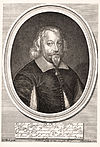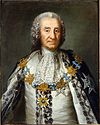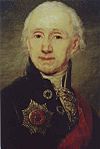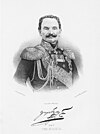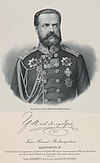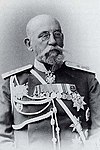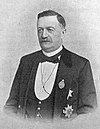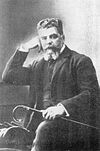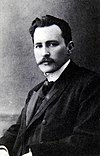
Porvoo is a city in Finland. It is located on the south coast of the country, on the Gulf of Finland. Porvoo lies in the eastern part of the Uusimaa region. The population of Porvoo is approximately 52,000, while the sub-region has a population of approximately 60,000. It is the 19th most populous municipality in Finland, and the 15th most populous urban area in the country.
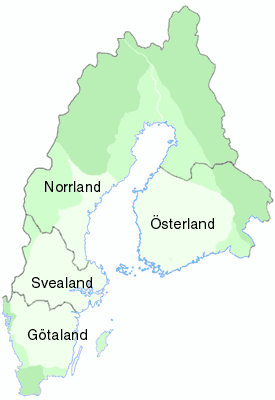
Österland ('Eastland') was a medieval term used for the southern part of Finland, one of the four traditional lands of Sweden. The term occurs in documents approximately between 1350–1470 and gradually fell out of use by the end of the 15th century. Before this period the term was used in plural, Österlanden ('Easternlands').

Count Georg Magnus Sprengtporten was a Finland–Swedish politician, count, baron, and general of the infantry.
Finland's language strife was a major conflict in mid-19th century Finland. Both the Swedish and Finnish languages were commonly used in Finland at the time, associated with descendants of Swedish colonisation and leading to class tensions among the speakers of the different languages. It became acute in the mid-19th century. The competition was considered to have officially ended when Finnish gained official language status in 1863 and became equal to the Swedish language.

Nikolay Ivanovich Bobrikov was a Russian general and politician. He was the Governor-General of Finland and the Finnish Military District from 29 August [O.S. 17] 1898 until his death, during the early reign of Emperor Nicholas II, and was responsible for the Russification attempt of Finland. After appointment as the governor-general, he quickly became very unpopular and was assassinated by Eugen Schauman, a Finnish nationalist born in Kharkiv.
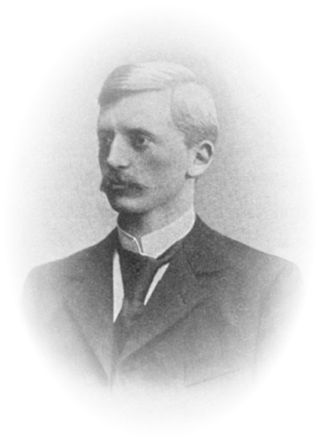
Eugen Waldemar Schauman was a Finnish nationalist activist and nobleman. In 1904, Schauman assassinated Nikolai Bobrikov, the Governor-General of Finland.

Franz Albert Seyn was a Russian general who was Governor-General of Finland between 24 November 1909 and 16 March 1917.

The Diet of Porvoo, was the summoned legislative assembly to establish the Grand Duchy of Finland in 1809 and the heir of the powers of the Swedish Riksdag of the Estates. The session of the Diet lasted from March to July 1809.

The Grand Duchy of Finland, officially and also translated as the Grand Principality of Finland, was the predecessor state of modern Finland. It existed from 1809 to 1917 as an autonomous state within the Russian Empire.

Finland declared its independence from Russia on 6 December 1917. The formal Declaration of Independence was only part of the long process leading to the independence of Finland.

The Finland men's national basketball team represents Finland in international basketball competition. The national team is governed by Basketball Finland.

Finland competed at the 1960 Summer Olympics in Rome, Italy. 117 competitors, 107 men and 10 women, took part in 92 events in 14 sports.

Knyaz Ivan Mikhailovich Obolensky, or Prince John Obolenski, was an Imperial Russian Lieutenant-General.
Erik Berg was a Finnish politician. Berg was born in Livonia and was of Baltic German descent. He served in the Imperial Russian Army, and later became a member of the Senate of Finland. After the 1917 February Revolution, Berg moved to France, where he worked as a businessman. He died in Paris, France.

Trust is a 1976 Finnish-Soviet historical drama film directed by Edvin Laine and Viktor Tregubovich. The film portrays the events leading up to the Finnish Declaration of Independence from Russia in 1917 and especially the role of Soviet leader Vladimir Lenin in them. The main roles are played by Kirill Lavrov as Lenin and Vilho Siivola as P. E. Svinhufvud.
Woldemar Alexander Valerian von Boeckmann was an Imperial Russian division and corps commander.
"Njet Molotoff" is a Finnish propaganda song composed by Matti Jurva, and written by Tatu Pekkarinen. Niet Molotoff was composed during the Winter War to boost morale and to mock the Soviet Union and the Red Army.
The February Manifesto, also known as His Imperial Majesty's Graceful Announcement was a legislative act given by Emperor of Russia Nicholas II on 15 February 1899, defining the legislation order of laws concerning the Grand Duchy of Finland. This included all laws which also concerned the interest of the Russian Empire. The manifesto left the Diet of Finland only an advisory role in passing these laws. The February Manifesto was seen as the beginning of the first period of Russian oppression and generally the start of Russification of Finland.



